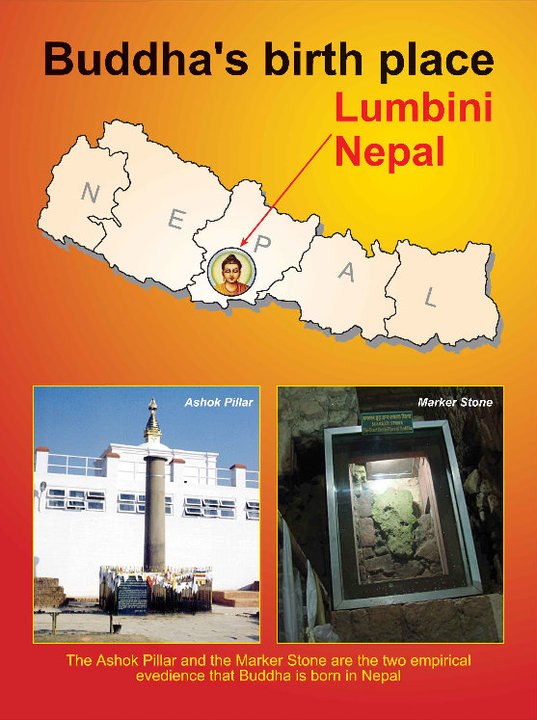Is China’s $3 Billion Investment into Lumbini Off?
Posted by Ram Kumar Shrestha on November 21, 2011
By Jane Poretsis
 Just weeks after publicly declaring that they had just signed a USD 3 billion deal with Nepal to
Just weeks after publicly declaring that they had just signed a USD 3 billion deal with Nepal to  develop Lumbini, the birth place of Buddha, China is left wondering where they stand.
develop Lumbini, the birth place of Buddha, China is left wondering where they stand.
An investment that would have seen China leading the project to transform the small town of Lumbini into a Buddhist Mecca and place of pilgrimage for Buddhists from around the world was mired in controversy from the start.
Sparking a row of lack of transparency, the news was met by concern in certain quarters of the Nepalese Government, which felt that it had been left in the dark and not consulted; prompting a dismissal from China on reports in the media of a secret pact with certain Maoist sections of the Government.
The Secretary in the Ministry of Culture, Modraj Dotel, also promptly quit stating: “I have resigned as works are being done in a non- transparent way which has become a matter of concern for us,” he was quoted as saying by Annapurna Post Daily.
However, responding to queries from The Kathmandu Post the Vienna-based United Nations Industrial Development Organisation (UNIDO) has denied entering into any valid contractual agreement with the Asia Pacific Exchange and Cooperation Foundation (APECF). Stating further, that contrary to what had been claimed: they were not involved in any activity related to the Lumbini ‘Special Development Zone.’ Flatly refuting claims made by APECF that they had signed a Memorandum of Understanding (MoU) with them.
Back in July, the Xinhua News Agency announced that UNIDO and (APECF) had signed a MoU in Beijing – with the Chinese Ambassador to Nepal Yang Houlan meeting with the Terai Madhes Democratic Party on the 9th August, clarifying that they had signed the Memorandum of Understanding with Tourism Minister Khagda Bahadur, who is also a Maoist leader.
The deal reportedly included a pledge to invest $3 billion through Nepal’s Tourism Ministry to develop Lumbini, the birthplace of Lord Buddha, by constructing an international airport, roads, hotels and other facilities in the region bordering India.
“The United Nations Industrial Development Organisation has not entered into any valid contractual agreement with the Asia Pacific Exchange and Cooperation Foundation, and, therefore, is not involved in any activity related to the Lumbini Special Development Zone in Nepal,” stated UNIDO. The MoFA (Ministery of Foreign Affairs) has asked its Geneva-based mission to find out the truth behind the MoU and report to Kathmandu about the controversial pact following the recommendation of State Affairs Committee of Legislature-Parliament.
“We are informed by our Geneva- based mission just today that UNIDO clarified there was no such agreement on Lumbini with APECF. Now onwards, the chapter is closed on the reported MoU on Lumbini,” Deputy Prime Minister and Foreign Minister Upendra Yadav said at the Reporters’ Club.
Khagendra Prasai the Culture Minister, also made it clear that the government was not pleased with the situation, or a recent trip made by APCEF officials to Lumbini – without its prior knowledge.
The MoU generated much debate after it was revealed that UCPN (Maoist) Chairman Pushpa Kamal Dahal and former Prince Paras Shah are the sitting vice-chairs of the Hong Kong-based APECF.
It was on July 15, Chinese state news agency Xinuha reported the event of APECF and UNIDO – and its Investment and Technology Promotion Office having signed a MoU on ‘Promotion South East Asian IPA Network’ in Beijing.
“The two groups signed the ‘Memorandum of Understanding in Support for the Lumbini Special Cultural Zone and Assistance Project for the Framework Design of Lumbini (Birthplace of Buddha) Special Development Zone (Nepal)’,” said Xinhua’s report.
Generating huge controversy, the two government agencies – MoFA and Ministry of Culture (MoC), claimed they were left unaware of the US $3 billion Lumbini project deal, questioning its credibility; which had an 11-point detailed plan to execute the project: further stating that any agreement with a foreign connection must be cleared by the Ministry of Foreign Affairs (MoFA).
Again controversially, after signing the MoU, Hu Yuandong the head of UNIDO’s China investment and technology promotion office had this to say: “that they would advise on the creation of the development zone and that the Lumbini project was in compliance with UNIDO’s principles on economy, environment and employment;”
In response, Ravindra Wickremasinghe Advocacy Assistant at UNIDO emailed this response: “An intended Memorandum of Understanding between UNIDO and APECF was never approved by the responsible UNIDO approval bodies. Any reference to a UNIDO involvement in the Lumbini Special Development Zone is thus without any legal and substantive basis.”
Obviously, a lack of coordination doesn’t just lie amongst the ’Nepalese Ministers’ – as mentioned by the Chinese Ambassador to Nepal, Yang Houlan back in August, whilst clarifying that the MoU had indeed been signed: to the Terai Madhes Democratic Party. Surely further questions also need to be asked of UNIDO, and their apparent lack of coordination?
Xiao Wunan, vice chairman of the APECF, said the Nepali government had given its full support for the creation of the Lumbini Special Cultural Zone, while a large number of institutions and individuals also had shown great interest in participating in the project.
Dmitri Piskounov the Managing Director of UNIDO, has sent a letter to MoFA stating that it has terminated the reported MoU with APECF and furthermore, does not bear any responsibility for the unauthorised deal.
However, since then there has been a new Prime Minister elected: Baburam Bhattarai who will lead and form a UCPN-Maoist government. By most standards he is quite moderate and would like to form a coalition. Elected on 28th August, the India-educated 57 year old has already invited the main opposition, Nepali Congress, to form a national unity government.
Nepal has faced political instability and deadlock, since the 2008 parliamentary election stalled the peace process, and the drafting of the constitution. Bhattarai has hopes that by forming a unity with Nepali Congress they could move forward and speed up the process.
Maybe a unified government would have fewer problems with ‘a lack of coordination.’
We may also not have heard the end of the China deal.
@The Kathmandu Post
































Leave a comment